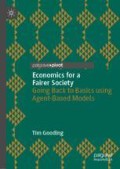Abstract
It is frequently said that the market economy is the most efficient economic organisation ever devised by human kind. However, numerous complexity experiments indicate that agent computational effort is inversely correlated with system efficiency . The market economy puts consider computation pressure on consumers because of the wide range of choice and prices available in a market economy. The Toy Trader model is used to test whether normal complexity characteristics hold true in monetary trade systems.
Access this chapter
Tax calculation will be finalised at checkout
Purchases are for personal use only
References
Arthur, W. (1994). Inductive reasoning and bounded rationality. The American Economic Review, 84(2), 406–411.
Axelrod, R., & Hamilton, W. D. (1981, March 27). The evolution of cooperation. Science, 211(4489), 1390–1396.
Brooks, B. R., Bruccoleri, R. E., Olafson, B. D., States, D. J., Swaminathan, S. A., & Karplus, M. (1983). CHARMM: A program for macromolecular energy, minimization, and dynamics calculations. Journal of Computational Chemistry, 4(2), 187–217.
Collard, F., Dellas, H., & Smets, F. (2009). Imperfect information and the business cycle. Journal of Monetary Economics, 56, S38–S56.
Dedeo, S. (2017, September 17). Is tribalism a nature malfunction? What computers teach us about getting along. Nautalus. Retrieved from http://nautil.us/issue/52/the-hive/is-tribalism-a-natural-malfunction.
De Grauwe, P. (2008). DSGE-modelling: When agents are imperfectly informed (European Central Bank Working Paper No. 897).
Dymski, G. A. (1993). Keynesian uncertainty and asymmetric information: Complementary or contradictory? Journal of Post Keynesian Economics, 16(1), 49–54.
Fontana, G., & Gerrard, B. (2004). A post Keynesian theory of decision making under uncertainty. Journal of Economic Psychology, 25(5), 619–637.
Helman, C. (2016, June 28). Berkeley lab: It takes 70 billion kilowatt hours a year to run the internet. Retrieved October 28, 2017, from https://www.forbes.com/sites/christopherhelman/2016/06/28/how-much-electricity-does-it-take-to-run-the-internet/.
Hogg, T., & Huberman, B. A. (1991). Controlling chaos in distributed systems. IEEE Transactions on Systems, Man, and Cybernetics, 21(6), 1325–1332.
Rauch, J. E. (1993). Productivity gains from geographic concentration of human capital: Evidence from the cities. Journal of Urban Economics, 34(3): 380–400.
Lorenzoni, G. (2005). Imperfect information, consumers’ expectations and business cycles. Cambridge: MIT Mimeo.
Rand, W., & Stonedahl, F. (2007). The El Farol bar problem and computational effort: Why people fail to use bars efficiently. Evanston, IL: Northwestern University Press.
Rust, J., Miller, J. H., & Palmer, R. (1994). Characterizing effective trading strategies: Insights from a computerized double auction tournament. Journal of Economic Dynamics and Control, 18, 61–96.
Van Ees, H., & Garretsen, H. (1993). Financial markets and the complementarity of asymmetric information and fundamental uncertainty. Journal of Post Keynesian Economics, 16(1), 37–48.
Wilhite, A. (2001). Bilateral trade and ‘small-world’ networks. Computational Economics, 18(1), 49–64.
Author information
Authors and Affiliations
Rights and permissions
Copyright information
© 2019 The Author(s)
About this chapter
Cite this chapter
Gooding, T. (2019). System Efficiency. In: Economics for a Fairer Society. Palgrave Pivot, Cham. https://doi.org/10.1007/978-3-030-17020-2_9
Download citation
DOI: https://doi.org/10.1007/978-3-030-17020-2_9
Published:
Publisher Name: Palgrave Pivot, Cham
Print ISBN: 978-3-030-17019-6
Online ISBN: 978-3-030-17020-2
eBook Packages: Economics and FinanceEconomics and Finance (R0)

